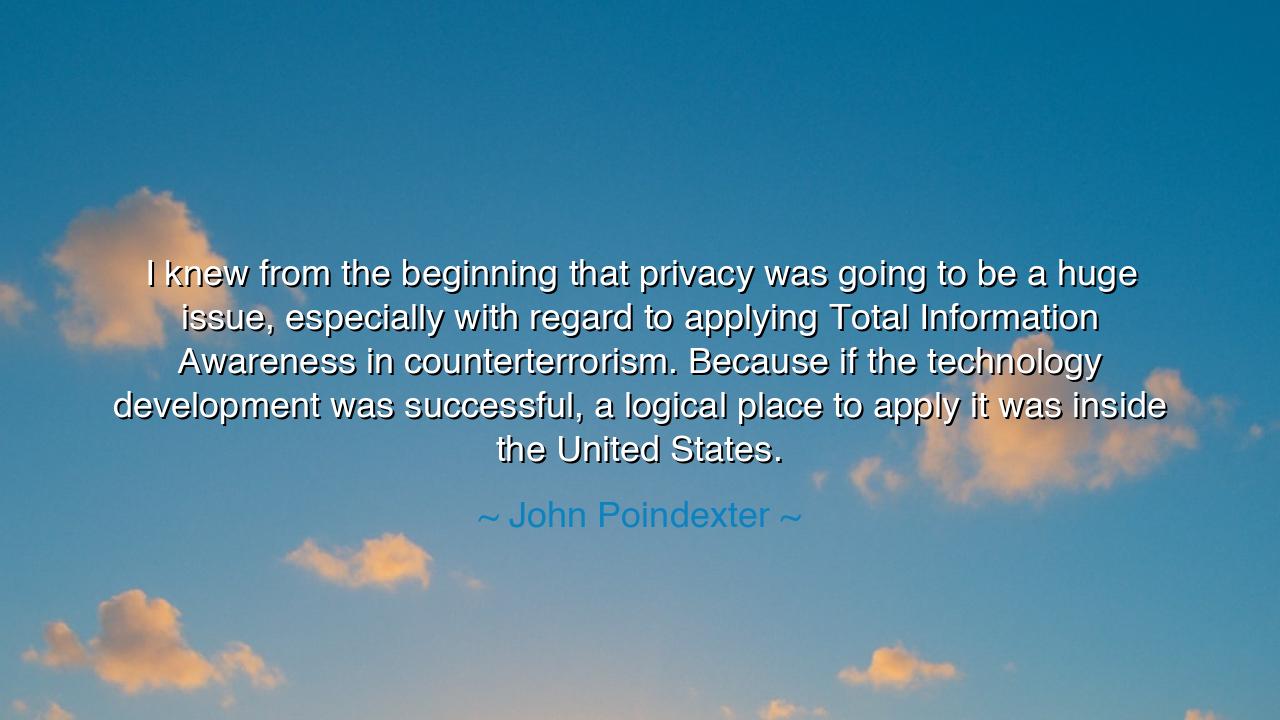
I knew from the beginning that privacy was going to be a huge
I knew from the beginning that privacy was going to be a huge issue, especially with regard to applying Total Information Awareness in counterterrorism. Because if the technology development was successful, a logical place to apply it was inside the United States.






Hear the words of John Poindexter, a man who stood within the shadows of power, speaking of a danger born not of swords or armies, but of unseen eyes: “I knew from the beginning that privacy was going to be a huge issue, especially with regard to applying Total Information Awareness in counterterrorism. Because if the technology development was successful, a logical place to apply it was inside the United States.” This is no idle reflection, but a warning that even the tools created to protect a nation can, if unchecked, become the very instruments that bind it.
When Poindexter speaks of privacy, he names one of the oldest treasures of human dignity: the sacred space of thought, word, and life that belongs only to the individual. To lose privacy is to be forever watched, forever judged, forever vulnerable to powers beyond oneself. And when he speaks of Total Information Awareness, he describes a vision of near-absolute surveillance—a web of knowledge so vast it can pierce into every corner of human life. Born of a desire to protect against terror, it carries also the danger of erasing the very freedom it seeks to defend.
The heart of his reflection lies in the paradox: that technology, designed for noble purposes, can become perilous when its scope expands unchecked. A weapon meant for enemies abroad may turn inward upon citizens. A system designed to guard against threats may itself become the greatest threat. Here Poindexter names a truth that has echoed throughout history: the line between protection and oppression is as thin as a hair, and once crossed, it is difficult to retreat.
Consider the tale of the Roman Republic. In times of great crisis, they appointed a dictator, one given total power to preserve the state. This was a tool of survival, meant only for moments of peril. Yet over time, men like Sulla and Caesar refused to relinquish this power. What began as a measure of safety became the end of liberty itself. In the same way, surveillance designed for counterterrorism may one day be turned inward, until the very people it was built to protect live under its shadow.
The meaning of Poindexter’s words is therefore grave: every advance in technology carries a mirror, reflecting both promise and peril. The issue is not whether the tool will grow powerful—it always will—but whether those who wield it will remain bound by law, ethics, and restraint. Without vigilance, the march of progress can make tyrants of guardians and prisoners of the free.
The lesson is clear: we must balance security with liberty, innovation with responsibility, and technology with human dignity. To demand safety at any cost is to sell one’s birthright of freedom; to ignore threats altogether is to invite ruin. The wise path lies between: to use tools of protection, but to bind them with law and accountability, so that their gaze never grows beyond their rightful scope.
Practical action follows: citizens must remain awake. Question the use of surveillance, and demand transparency. Lawmakers must create boundaries, ensuring that technologies born for war are not silently turned upon the innocent. And each individual must treasure privacy, guarding it not only in law but in daily life—choosing wisely how much of themselves they surrender to systems they do not control.
Thus John Poindexter’s reflection endures as a sober teaching: “If technology is successful, it will surely be applied inward.” Let us therefore remember that freedom is not lost in sudden blows, but in gradual steps, in conveniences that lull us, in protections that bind us. Guard privacy, cherish liberty, and remain vigilant, for no nation can remain free if its people surrender their own shadows to the all-seeing eye.






AAdministratorAdministrator
Welcome, honored guests. Please leave a comment, we will respond soon